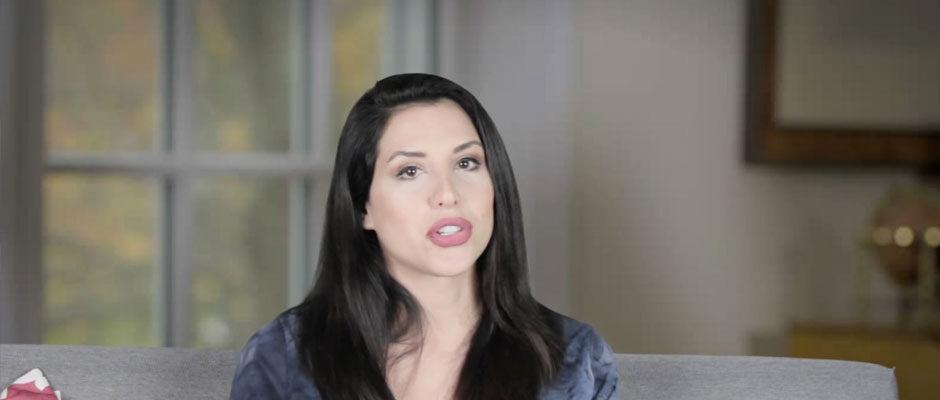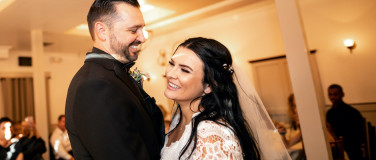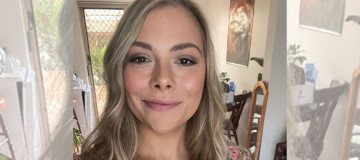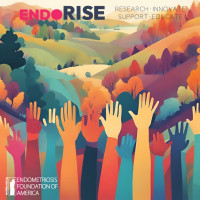Endofound.org: Today, we'll be hearing from Diana Falzone, a TV personality reporter and her experience of endometriosis. Welcome, Diana.
Diana: Thank you.
Endofound.org: And can you start by telling us where you're from and what you do?
Diana: I am from New York, New York and I'm a reporter and host.
Endofound.org: Awesome. What did you know about endo, if anything, before your diagnosis?
Diana: I knew very little about it. I heard from people that it was terrible cramps and bleeding and I always had pictures in my mind of a woman with a hot water bottle kind of rocking but other than that, I didn't understand the severity of it, how debilitating it could be or any of the implications it had.
Endofound.org: Did you have any symptoms or were you mostly asymptomatic?
Diana: I was asymptomatic but looking back and obviously, you know, hindsight is 20/20, looking back, there were so many times I was sick as a little girl, having my period and not putting things together and being told by doctors, "Oh, you have ovarian cysts, and you just must have had one pop." Now looking back, that was a big sign of endo.
Endofound.org: Walk us through, now that you have the symptoms down, it kind of comes and goes, puberty. Walk us through what it's like on a typical day when you might have a flare-up.
Diana: Well I've been really lucky sort of. I've had 2 surgeries for endometriosis in a year and 2 months, which is a lot. But a typical flare for me usually starts on my right side, which is where my problem has been and it feels as though there is a hot burning piece of coal in my abdomen that's just pulsating. As if someone's taking a knife and bringing it down. It's a kind of pain that only women with this disease can understand.
Endofound.org: And when did you first notice this kind of pain or kind of, when would it start affecting your life?
Diana: It started affecting my life, it was a sudden onset and it was my Mom's birthday in February 2016 and we took her out for a birthday brunch and she noticed something was wrong with me and I said, "I'm not feeling well." She said, "You have no color in your face." And I thought, "Well, maybe I have a virus." And the next day, while I was at work, I had a kind of pain that I've never felt before. It was the pain I described with the burning and the stabbing and then I had heavy bleeding, which was not my time of the month to have that and I got very alarmed and knew something was wrong and I needed immediate attention.
Endofound.org: Walk us through the steps of seeing doctors or getting any feedback, diagnosis.
Diana: One thing that became incredibly frustrating and disheartening was going to an E.R. in New York City and having a general practitioner who really had no business being in my business, telling me that he thought my pain and my other symptoms were a hormonal imbalance and the flu. And I've had the flu before, this was not the flu. Women know the difference between having the flu and having something serious going on in their bodies. I asked to see a gynecologist. He told me there was no one available in all of this big, fancy Manhattan hospital. I asked one of my girlfriends to visit me there, accompany me there, to be a stronger voice and he kinda poo-pooed us and told me to go home and see my gynecologist in the morning, which I had to fight for an appointment. And when she did see me, she said she could find nothing wrong. The word endometriosis was never mentioned. She just said I looked very sick, I had a fever and I should go home and rest and bleed it out.
Endofound.org: Were the reactions of your family and friends, can you remember, similar or did you find that they had different responses?
Diana: No. I'm very lucky to have awesome parents and loved ones and an incredibly supportive boyfriend. I'm not one to have really any medical issues. I usually power through things, which I think a lot of females do, which is not always a good thing. And mostly everyone was really concerned, really concerned and knew that they had to help me get to the bottom of this.
Endofound.org: Once you realized that this doctor is telling you to bleed it out and giving you these crazy ideas, what were your next steps? Did you, how did you react to that emotionally?
Diana: I was really upset, really upset because I thought to myself, "I'm not a hysterical person." I trade in facts for my living so I research and analyze and I was researching and analyzing myself and I went to some of my friends that I thought knew enough about the health profession and they were able to get me into very knowledgeable hands. Where it was going to this new gynecologist within two and a half minutes of her doing a transvaginal ultrasound, she said, "You have a mass in your uterus." And it was at that point my knees were buckling and when you hear mass, you don't know if that means a tumor, you don't know if that means cancer, you just know in that moment that your life has changed.
Endofound.org: Were you ever told that you had a different disease? Or just that you had the mass?
Diana: At that moment, no. I was not told I had a different disease. She suspected it was endometriosis. It was at that point she said, "We need to do an AMH test." Which is an anti-mullerian hormone test because she believed that something was attacking my fertility as well. And we had to get down to the bottom of that.
Endofound.org: And how did you first treat endometriosis?
Diana: I ended up having to go right in for emergency surgery relatively quickly. It was within a number of days. It was pain that was about a nine and completely crippling. It was really tough.
Endofound.org: Most people talk about birth control and different options and hot packs and different things they've tried over time but it seems like for you it's a really quick process.
Diana: It was. It kind of was like boom, you have endo! It wasn't a nice greeting, let's say that but between going from the doctors' appointments, being seen by specialists and getting into the hospital for surgery, even to this day, I like have a "woobie", my security blanket are my heating pads. I mean I slept with one last night. It's just, it's the only thing that really gives you immediate comfort other than like an ibuprofen, which really doesn't do much. Not for stuff like lesions growing on your organs. You know?
Endofound.org: Were you nervous about the surgery?
Diana: I was nervous but I was in such excruciating pain that I felt like a relief. I thought, "If this is what's gonna fix me." And I remember I'm such a work addict, that I was doing emails in the E.R. to work and finishing up a story and the nurse took my phone and then said, "You're going in the O.R." And I went, "Huh?" And immediately, I was raised in a Catholic religion, I did the sign of the cross and I was like, "Okay God, don't let me lose my reproductive organs." Because for me, it's always been incredibly important but I always imagine being a mother and with endometriosis, it has potentially robbed me of that so that in itself has been an extremely hard journey that I have been continually going through. Trying to fight to become a Mom one day.
Endofound.org: Have you come to terms with that or reflected on it over the last year?
Diana: I've reflected on it a great deal for sure but I haven't given up so I refuse to believe that it's not gonna happen and I'm working with a really wonderful reproductive urologist and specialist so that I can become a Mom.
Endofound.org: And after surgery, what were your feelings both physically and emotionally?
Diana: After surgery the first, I had two, so after the first one I was in a lot of pain so I was concerned that I wasn't fixed. That I wasn't better and that was a very big concern of mine but as the days went on I could feel that relief That stabbing pain was leaving my body but I still wasn't 100 percent. I went back to work after ten days and had trouble walking and was hobbling around but it's that mentality of, "You just have to keep on keeping on." What I did know and what I learned through this process is that it's very important for women with endometriosis that is still having symptoms to go and see a physical therapist because there is a lot of pelvic floor dysfunction and a lot of pain referral. Especially for women that have had endo for years and years and have been contorting their bodies in certain ways in order to get through the pain. So for me, going to P.T. has been a really big helper.
Endofound.org: Were there any other surprising insights from your endo journey?
Diana: Gosh. Some people are not ready to hear about women's health. And that's been surprising to me. But another amazing thing about the endo journey is the community of women who are there to support each other and medical specialists and as much as we talk about women having each other's back in this community, there are so many caregivers and men that have been there. I mean my Dad, my brother, my boyfriend have learned so much about women's reproductive organs because of this and have been there to comfort me and hold my hand. My boyfriend has been through both surgeries, has fallen asleep at the hospital in uncomfortable chairs and let me know before my second surgery that whatever the outcome was, he was gonna be there and that's been incredible.
Endofound.org: Do you have any advice for other parents, partners how to treat a loved one with endometriosis?
Diana: Listen, there are so many emotions that go on with being sick. I once heard someone say that when someone in the family gets sick, you all get sick and that's true but when you're a caregiver it's difficult not to get emotional. I know from my Mom, it was an incredible emotional journey and she took a lot of the onus on herself. Like why didn't I pay attention to your symptoms when you were 11, 12, 13. I said, "How could you have possibly known?" And I think there's this guilt from mothers especially that they should be doing more for their daughters but if you don't have the knowledge, you don't have the know how. So the best thing you can do is listen and learn and learn as you go because we don't have all the answers. I'm learning every day about this illness. I'm a newbie to it. It's only been a year and a half for me. And every day I'm learning how my body works, about how this illness works and about what I can be doing to even help women in this community.
Endofound.org: Do you have any suggestion or resources for adolescents or young women going through puberty and thinking they might have endo?
Diana: Endofound.org and I are not saying that because I'm trying to give a shout out but I actually, before I knew anything about this foundation, as soon as I heard the word endometriosis and I had it, I went right on the website and learned the symptoms. You learn where you can go for more information and it's a huge help.
Endofound.org: What reactions do you receive now when you tell people you have endo.
Diana: I don't want to say that endo is becoming a fashionable disease because that sounds awful but people are talking about it. So now it's a buzz word and that means that we're getting the attention that we so deserve.
Endofound.org: If could change one thing about our culture, healthcare, or education that could impact endo, what would you change?
Diana: Just one thing?
Endofound.org: Or 2 or 3.
Diana: Gosh, I think there's a lot of stigmas about women's reproductive health. I think that we've politicized the disease so much, anything below the waist as a really great documentary and or what talks about is kind of radicalized and become too provocative when it's really just about making sure women lead their best, most healthy, most productive lives and endo takes a lot of that away when you can't function as your best self. So, I think it's please pay attention to us. Health care providers don't ignore us. Don't say that we're crazy or it's all in our head just because we don't look sick. We're sick and we need the help.
Endofound.org: What are your dreams for the future? In twenty years or thirty years how endo looks in our culture and health care?
Diana: I hope that endo is something that is widely discussed and known about and that there'll be better tests so that we don't have to go under the knife to actually get a proper diagnosis and that maybe one day there won't be only surgery as a way to help the disease and remember there is no cure right now so I would love to see in twenty years that endometriosis is a disease that we have a cure to.
Endofound.org: For all your endo sisters out there, what would you like to tell them, if you had something to say? Give them some advice on your experience.
Diana: Never doubt yourself. Always listen to that inner voice no matter what doctor is telling you that your fine and just go home and bleed it out. Always advocate for you and if you can't do it for yourself, ask a friend ask a loved one to be in the room at the hospital or the doctor's office so you feel more empowered but always fight for you and your health. Never, ever, ever be sorry for that.
Endofound.org: Anything else you'd like to say about your story or for our listeners?
Diana: As difficult as it has been to live with endo, I have encountered some incredible people and made strong friendships that could rival friendships that I've had for ten, fifteen years because there is a bond when you meet someone with a chronic illness that's invisible, very little is understood about it. So I'm thankful for it and I'm thankful for the ability to talk about my journey in the hopes that not only do we raise awareness, but that people don't just feel alone. Because there are a lot of women out there, and I've seen this on social media, that just feel so isolated, and so misunderstood. And just know that you're not, that you're not alone.










